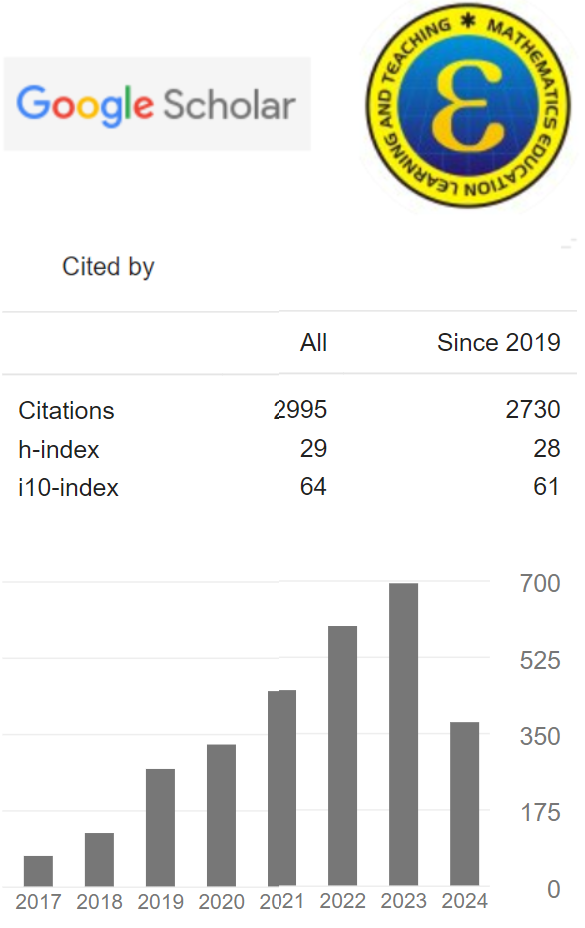Development of Geometry Module Based on Computational Thinking Assisted by GeoGebra
(1) UIN K.H. Abdurrahman Wahid Pekalongan
(2) UIN K.H. Abdurrahman Wahid Pekalongan
(*) Corresponding Author
Abstract
Keywords
Full Text:
PDFReferences
Anwar, S. (2014). Pengolahan Bahan Ajar. Bandung: UPI.
Arif, T. A., & Iskandar, I. (2018, July). Teknik Penyusunan Bahan Ajar Bahasa Indonesia Bagi Guru di Sekolah Dasar. In Prosiding Seminar Nasional Pendidikan (Vol. 1, No. 1).
Fakhriyah, F., Masfuah, S., & Mardapi, D. (2019). Developing Scientific Literacy-Based Teaching Materials to Improve Students’ Computational Thinking Skills. Jurnal Pendidikan IPA Indonesia, 8(4), 482-491. https://doi.org/10.15294/jpii.v8i4.19259
Gadanidis, G., Hughes, J. M., Minniti, L., & White, B. J. (2017). Computational thinking, grade 1 students and the binomial theorem. Digital Experiences in Mathematics Education, 3 (2), 77-96. https://doi.org/10.1007/s40751-016-0019-3
Japa, N., Suarjana, I. M., & Widiana, W. (2017). Media Geogebra dalam pembelajaran matematika. International Journal of Natural Science and Engineering, 1(2), 40-47. https://doi.org/10.23887/ijnse.v1i2.12467
Maharani, A. (2020). Computational thinking dalam pembelajaran matematika menghadapi Era Society 5.0. Euclid, 7(2), 86-96. https://doi.org/10.33603/e.v7i2.3364
Moleong, L. (2002). Metodologi Penelitian Kualitatif. Bandung: PT. remaja Rosdakarya.
So, H. J., Jong, M. S. Y., & Liu, C. C. (2020). Computational thinking education in the Asian Pacific region. The Asia-Pacific Education Researcher, 29, 1-8. https://doi.org/10.1007/s40299-019-00494-w
Papert, S. (1980). Mindstorms: Children, computers, and powerful ideas. New York: Basic Books.
Rahadyan, A., Hartuti, P. M., & Awaludin, A. A. R. (2018). Penggunaan Aplikasi Geogebra dalam Pembelajaran Matematika di Sekolah Menengah Pertama. Jurnal PkM Pengabdian Kepada Masyarakat, 1(01), 11-19. https://doi.org/10.30998/jurnalpkm.v1i01.2356
Rahmania, S., Sulisworo, D., & Rahma, R. (2023). Pengembangan e-LKPD Bermuatan Program Linear dengan Pendekatan Computational Thinking untuk Meningkatkan Kemampuan Berpikir Kritis Siswa. JEMAS: Jurnal Edukasi Matematika dan Sains, 4(1), 45-54. http://www.journal.umuslim.ac.id/index.php/jemas/article/view/1912
Rahmadhani, L. I. P., & Mariani, S. (2021, February). Kemampuan Komputasional Siswa Dalam Memecahkan Masalah Matematika SMP Melalui Digital Project Based Learning Ditinjau Dari Self Efficacy. In PRISMA, Prosiding Seminar Nasional Matematika (Vol. 4, pp. 289-297). https://journal.unnes.ac.id/sju/index.php/prisma/article/view/45048
Sa’diyyah, F. N., Mania, S., & Suharti, S. (2021). Pengembangan Instrumen Tes Untuk Mengukur Kemampuan Berpikir Komputasi Siswa. JPMI (Jurnal Pembelajaran Matematika Inovatif), 4(1), 17-26. http://dx.doi.org/10.22460/jpmi.v1i1.p%25p
Sentance, S., & Csizmadia, A. (2017). Computing in the curriculum: Challenges and strategies from a teacher’s perspective. Education and Information Technologies, 22 (1), 469-495. https://doi.org/10.1007/s10639-016-9482-0
Ling, U. L., Saibin, T. C., Naharu, N., Labadin, J., & Aziz, N. A. (2018). An evaluation tool to measure computational thinking skills: pilot investigation. National Academy of Managerial Staff of Culture and Arts Herald, 1, 606-614. https://doi.org/10.1007/978-981-13-7279-7_64
Widoyoko, E. P. (2010). Evaluasi Program Pembelajaran. Yogyakarta: Pustaka Pelajar.
Wing, J. M. (2006). Computational thinking. Communications of the ACM, 49(3), 33-35. https://doi.org/10.1145/1118178.1118215
Wing, J. M., & Stanzione, D. (2016). Progress in computational thinking, and expanding the HPC community. Communications of the ACM, 59(7), 10-11.
Wondo, M. T. S., Mei, M. F., & Seto, S. B. (2020). Penggunaan Media Geogebra dalam Pembelajaran Geometri Ruang untuk Meningkatkan Minat dan Hasil Belajar Mahasiswa. Jurnal Pendidikan Matematika, 11(2), 163-171. https://doi.org/10.36709/jpm.v11i2.12049
Zahid, M. Z. (2020, March). Telaah kerangka kerja PISA 2021: era integrasi computational thinking dalam bidang matematika. In PRISMA, Prosiding Seminar Nasional Matematika (Vol. 3, pp. 706-713).
DOI: 10.24235/eduma.v12i1.13265
Article Metrics
Abstract view : 2 timesPDF - 0 times
Refbacks
- There are currently no refbacks.
Copyright (c) 2024 EduMa: Mathematics education learning and teachingâ€â€â€Ž













